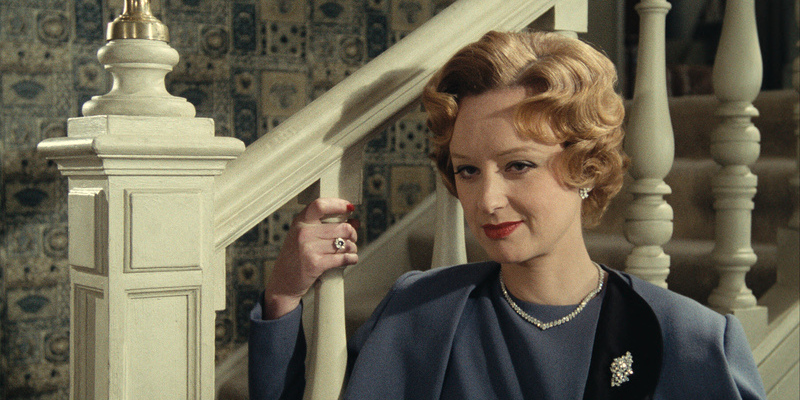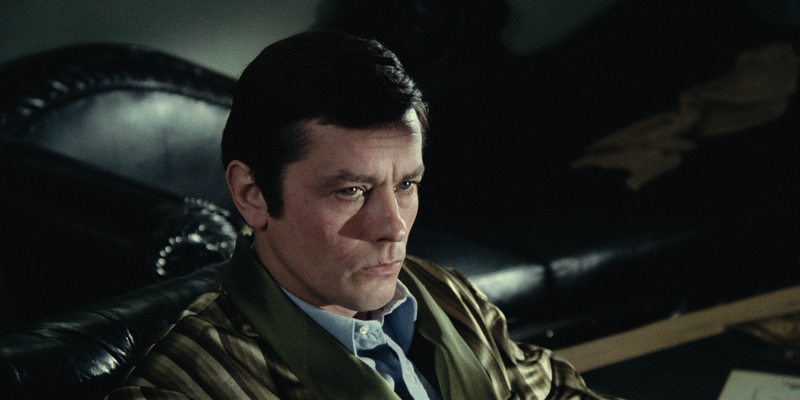
An art dealer profitting from the flight of Jews from wartime Paris finds
himself mistaken for a Jewish man.
Review by
Eric Hillis
Directed by: Joseph Losey
Starring: Alain Delon, Jeanne Moreau, Francine Bergé, Juliet Berto, Jean Bouise, Suzanne Flon,
Massimo Girotti, Michael Lonsdale

Isn't it awkward when you love the culture of a race but despise the
members of that race? For White Americans in the early 20th century, the
arrival of the phonograph was a gift from God. Now they could listen to
Black music without having to invite Black musicians into their homes.
In Vichy France of the early 1940s, the Catholic aristocracy were quite
taken with Jewish art. Problem was, they despised Jews. Luckily for
them, when France's Jews cottoned on to their impending fate, they began
to sell off their artworks for a pittance before fleeing the country.
The French middle and upper classes could now possess enviable works of
Jewish art while living in a nation largely free of a Jewish presence.
What a bargain!
Of all the movies made about the Holocaust, Joseph Losey's 1976
French production Mr. Klein is arguably the most caustic.
We never see any images of the death camps, and there isn't a swastika
to be seen in a single frame of the movie. Instead
Mr. Klein is set in the weeks leading up to the
implementation of the final solution, when France's Jews are living in
fear, well aware of what lies ahead, while the nation's gentiles are
keeping their heads down and ignoring the bureaucracy being put in place
for a future pogrom at best, profiting from Jewish suffering at
worst.

Robert Klein (Alain Delon) falls into the latter camp. An art
dealer, he's making hay while the clouds descend, paying Jews a pittance
for the artworks they need to flog before they escape the country. He
has a well rehearsed spiel about how he feels guilty buying art under
such circumstances, but he clearly doesn't mean a word of it.
One day Klein receives a copy of 'Jewish Information', a newspaper for
Paris's Jewish community, delivered to his apartment. Surely there must
be some mistake? Despite his surname, Robert Klein is a good Catholic.
But the paper is indeed addressed to a Robert Klein at his very own
address.
Worried that what seems like an innocent mistake might lead to him
being branded a Jew, Klein begins an investigation and learns that there
is another man by the name of Robert Klein living in Paris. The further
down the rabbit hole he descends in trying to find his namesake, the
more Klein incriminates himself with the investigating authorities.
Overcome by paranoia, Klein begins to wonder if maybe he has Semitic
roots himself.
The French have long been reluctant to depict the horrors of Vichy
France on screen, but American director Losey and his Italian
screenwriter Franco Solinas have no such qualms. Movies set in
occupied Paris usually depict a city under the Nazi jackboot, with
swastikas flying from every building and tanks rolling through the
streets. Such imagery is notably absent from Losey's film, which
emphasises the point that French Jews weren't so much victims of the
occupying Germans as of their French neighbours. Erasing Nazi
iconography gives Mr. Klein a timeless "it could happen
here" feel.

Losey constructs two scenes that are positively anger-inducing in their
matter of fact detailing of how Jews were treated. The film opens with a
harrowing scene in which a naked elderly woman of vaguely "non-European"
appearance is prodded and measured by a doctor performing a form of
phrenology to determine if she is a member of the Semitic tribe. The
scene ends with a cruel punchline when the "patient" puts her clothes
back on and asks the doctor how much she owes him. Another scene sees
Klein visit a cabaret where a performer dressed like a grotesque
caricature of a Jew performs a routine that draws laughs from the crowd
with his depiction of crude stereotypes. Like the tennis match in
Hitchcock's Strangers on a Train, there's one figure in the crowd who remains still. Klein's
girlfriend, Jeanine (Juliet Berto), is the only one repulsed by
the onstage antics. As those around her guffaw, she looks around and
realises how out of place she is (might she herself be Jewish?). Up to
that point Jeanine has been portrayed as a bimbo, a ditz, but in that
moment we realise she is the only character in the movie with a moral
compass.
Losey finds a wonderful way of emphasising Klein's narcissism through his
clever blocking of scenes. While practically every scene in the movie
revolves around the eponymous protagonist, Losey's camera often wanders
away from Klein to focus on those around him, often women who are madly
in love with the cad and whose hearts are quietly shattering in the
background. In this way, Losey uses his mobile camera in similar fashion
to how Altman uses sound to shift the focus in a scene from the person
we think the scene is about to those in the background. It leads to an
ultimate punchline in which Klein is so consumed with his quest that he
doesn't notice a certain figure standing behind him.
Like Losey's most celebrated film, 1963's
The Servant, Mr. Klein deals with shifting personas. As the movie
reaches its conclusion we're unsure whether the other Klein really
exists or if he's some Golem conjured to torment this man who has
exploited his Jewish neighbours. There's a heavy dose of Kafka in
Klein's dealings with bureaucracy, and even
North by North West is a touchstone.

Just as Losey seems to draw inspiration from various sources, so too
has Mr. Klein seemingly inspired subsequent filmmakers.
Michael Haneke's 2005 thriller Hidden sees Daniel Auteil
play a man similarly tormented by an unknown source, and that film
highlights another racist chapter in 20th century French history, the
1961 Seine River massacre. Haneke's movie also draws influence from
David Lynch's Lost Highway, which itself has a similar premise to Losey's film. Spielberg's
Schindler's List has a similarly caustic tone with moments
of black as night comedy. Even Larry David seems to have referenced
Mr. Klein in a season of
Curb Your Enthusiasm when the none more Jewish David
begins to believe he was actually born to Christian parents.
Brushed up in a swanky new restoration, Mr. Klein is
primed to find a new audience. With the subject of cultural
appropriation a hot button issue in recent years, it's lost none of its
insight into how we relate to art and those who create it.

